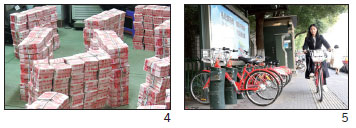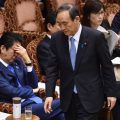Monday January 15
US tax cut may bring mixed effect
The US corporate tax cut could provide an opportunity for Chinese companies to increase their market share and even become top leaders of their sectors in China, considering that their US competitors may adjust business strategies in China, EY experts said.
The tax cuts and jobs act, which has been signed into law by US President Donald Trump, will allow US companies to bring offshore profits home at greatly reduced tax rates.
“The new tax law will incentivize multinational US companies to repatriate their offshore profits, including profits in China, back to their home country. This may lead to a shrinking of their market share in China while offering opportunities of a rise in market position for their Chinese counterparts,” said He Lipeng, transaction tax partner of EY, one of the largest international accounting firms in the world.
2017 one of hottest in decades for China
China experienced its third-highest average temperatures in more than six decades last year as greenhouse gas emissions in the country kept increasing, according to the China Meteorological Administration.
The average temperature through 2017 was about 10.4 C (50.7 F), more than 0.8 C above the yearly average and the third highest since 1951, according to China Climate Bulletin.
Monitoring stations across the country observed 12.1 days with temperatures above 35 C, 4.4 days more than average and 1.4 days more than 2016, said the bulletin.
It also said 437 monitoring stations, or 71 percent of the total, across the country observed extreme hot weather, up by 37 percent from 2016.
Tuesday January 16
Early-stage education becomes big business
Rising demand in China for top-quality early-stage education, and current inadequate supply, are prompting private and foreign investors to rush into the segment in the hopes of huge and rapid growth.
Shopping malls in big cities now house early-stage educational institutes that offer classes covering every conceivable subject, ranging from English language to arts.
In the past few months, however, alleged scandalous abuse of kids at kindergartens and early-stage educational institutes in Shanghai and Beijing led to a serious review of the situation, further stoking the demand for better, safer services in this segment.
Courses currently on offer tend to be rather expensive. A 45-minute class at Romp N’ Roll, an early-stage education center in Beijing, can cost up to $46.
As early-stage education is not part of the country’s compulsory education system, industry insiders expressed concerns over lack of regulation. (Photo 1)
Crude oil imports to increase 7.7%
Imports are expected to make up more than 70 percent of China’s crude oil supply in 2018 amid sound economic growth, said a research arm of State-owned energy giant China National Petroleum Corp.
The country’s net crude oil imports will rise 7.7 percent to 451 million metric tons in 2018, accounting for 70.1 percent of China’s total supply, according to a report released by CNPC Economics & Technology Research Institute.
Oil imports by the world’s largest energy consumer rose 10.8 percent to 396 million tons last year, meaning China overtook the United States to become the world’s largest oil importer. The country relied on imports for 67.4 percent of its oil supply last year.
China’s oil demand is expected to increase 4.6 percent year-on-year to 615 million tons in 2018. (Photo 2)
Wednesday January 17
Government seeks to end false economic data
The central government will step up its efforts to stamp out inflated and falsified economic data after some local governments in the country cut their gross domestic product growth and admitted fudging key economic numbers, as part of the country’s overall efforts to achieve high-quality growth, economists said.
The latest move by the local governments to adjust their GDP data reflected greater pressure from the central government to ensure data accuracy and its growing effort to address some technical problems in the country’s statistics system, said Zhang Yansheng, chief economist at China Center for International Economic Exchanges.
China’s top policymakers have pledged to improve the country’s statistics system and the performance evaluation of local governments with an emphasis on high-quality growth.
JD seeks $2b in fundraising for logistics unit
JD, China’s second-biggest e-commerce firm, has kicked off a fundraising round at its logistics unit with a target of at least $2 billion, and eventually plans to list the business overseas, people with direct knowledge of the matter said.
JD, which only trails Alibaba Group Holding Ltd in China’s e-commerce market, has invited a select group of investors to join the funding round that values its logistics business, JD Logistics, at around $10 billion, two of the people told Reuters.
The move comes as China’s major e-commerce companies are looking to bulk up their logistics businesses to support their global expansion ambitions and boost revenues by offering services to third-party entities.
Chinese investment firm Hillhouse Capital Group and Sequoia Capital China will likely be lead investors of JD Logistics’ funding round, while a number of State-owned and international investors have also shown strong interest in the deal, according to the people, who could not be named as the information is confidential. (Photo 3)
Thursday January 18
Police make country’s biggest counterfeit bust
Police seized fake bank notes with a total face value of more than $33.2 million after cracking the biggest counterfeiting case in the nation’s modern history late last year, a senior police official said.
Lin Weixiong, deputy director general of the Guangdong Provincial Department of Public Security, said 14 suspects thought to belong to a criminal gang were detained while a large amount of semi-finished fake bills and printing equipment was seized after a production site and warehouse were raided.
“The case is regarded by the Ministry of Public Security as the country’s largest counterfeiting case since the founding of New China in 1949,” Lin said at a news conference in Guangzhou, the provincial capital.
None of the finished counterfeit bank notes had reached the public at the time of the busts, authorities said. (Photo 4)
Solar-powered bikes introduced in East China
Hangzhou in East China recently rolled out solar-powered bikes.
Compared with ordinary bikes, the red-colored bikes have a battery slot on the front and electric motor on the back. About 200 of the bikes, which can be rented with mobile phones, are available at 16 public bike service centers across the city.
Along with bikes, locks have been provided for renting the solar power battery, which is free for use in the first three months of the trial operation.
By the end of January, a total of 1,000 such bikes are expected at 51 public bike service centers. (Photo 5)
Friday January 19
Lego toys, Tencent form a partnership
Danish toymaker Lego is teaming up with Chinese internet giant Tencent Holdings Ltd to jointly develop online games and video and a social media network for Chinese children.
Under the new partnership, Lego says it will aim to create a safe online ecosystem with platforms, content and experiences tailored for Chinese children and in which it will increase awareness of digital safety at a time when more children spend time online.
Privately-owned Lego has seen a slowdown in sales growth in recent years, but the Chinese market has been a bright spot with sales growing 25-30 percent in 2016.
Last year, Mattel struck deals with Chinese e-commerce giant Alibaba Group Holding Ltd and online content developer BabyTree to sell interactive learning products based on its Fisher-Price toys.
Lego has about a 3 percent market share in China, followed by Mattel and Hasbro with around 2 percent and 1 percent, respectively, according to Euromonitor International.
Efforts stepped up to rein in SOE debt
China aims to cut the average debt-to-asset ratio by another 2 percentage points for its 98 centrally administered, State-owned enterprises by 2020, the country’s State asset regulator said.
The average debt ratio for central SOEs stood at 66.3 percent by the end of 2017, down 0.4 percentage point from the beginning of the year. Sixty-two of these big companies have managed to lower their debt ratio in comparison with the previous year and 40 of them saw this figure fall by more than 1 percent.
China’s centrally administered SOEs earned $218 billion in profit in 2017, up 15.2 percent year-on-year.
Eager to compete with their foreign rivals, central SOEs have been fostering new growth engines by expanding their footprints in strategic new industries and high-tech sectors, such as the digital and green economies, artificial intelligence and new energy vehicles.




